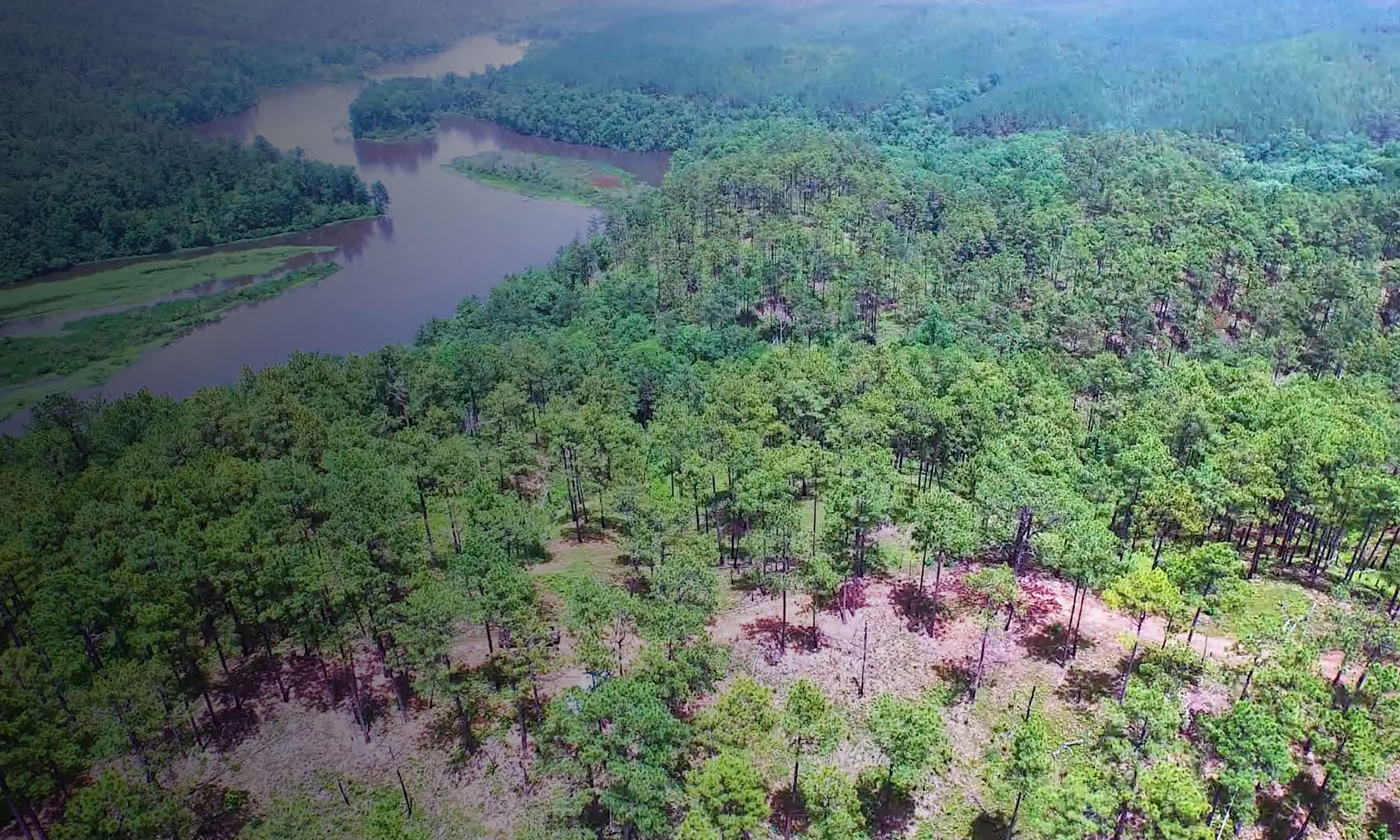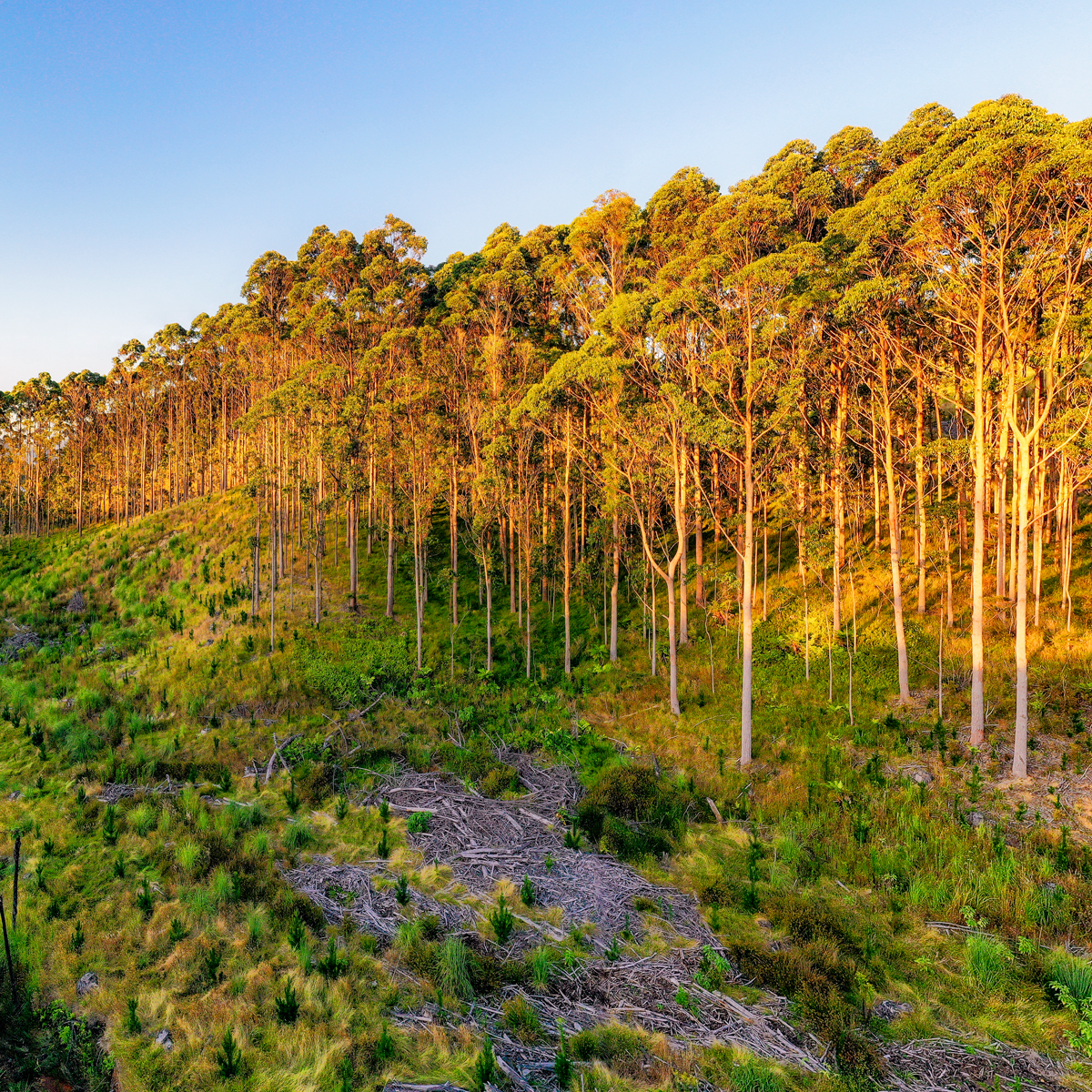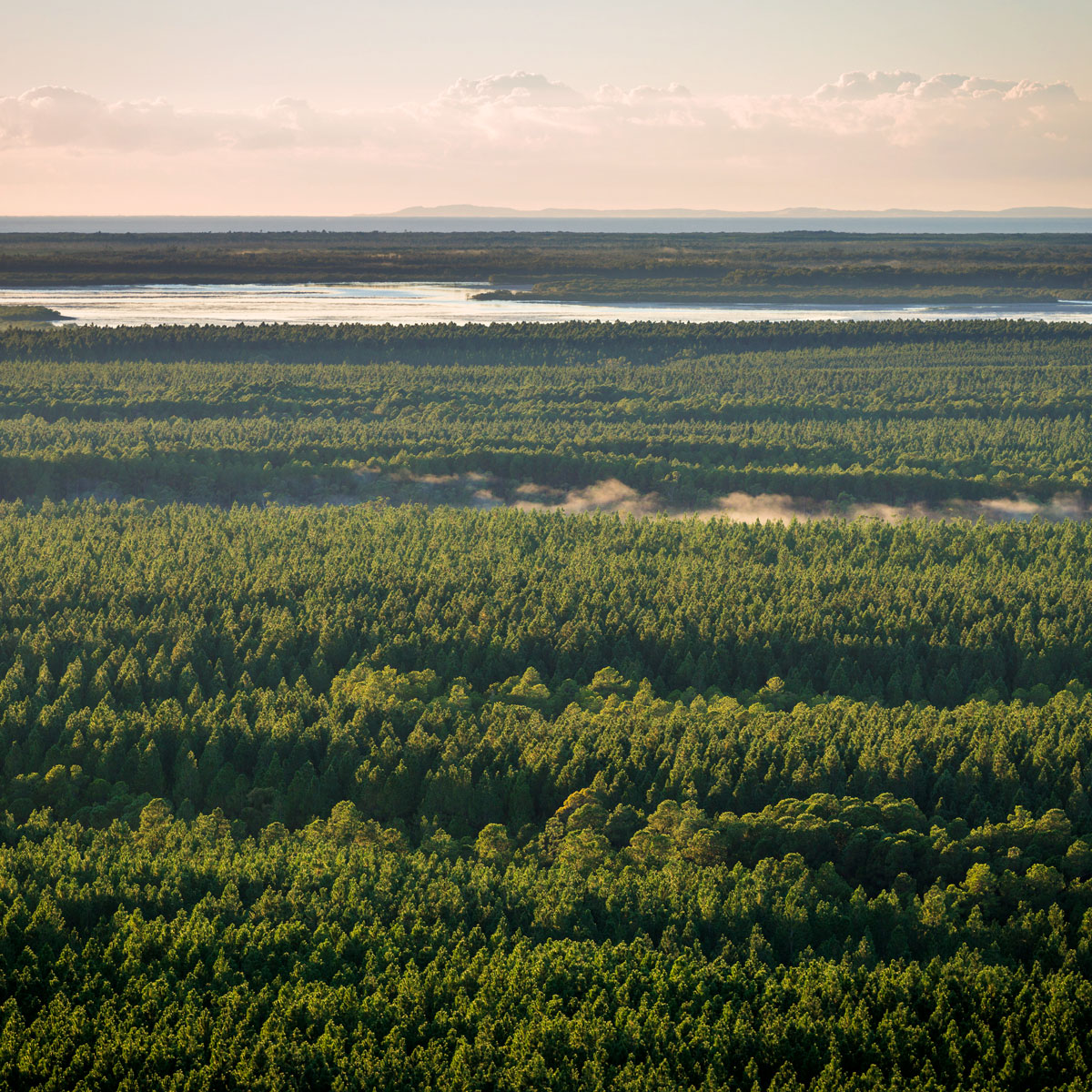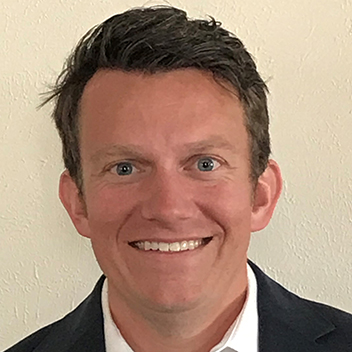
Timberland investment
Creating value through the sustainable management of timberland assets
Why timberland?
Timberland investments have long demonstrated strong financial results and can provide portfolio diversification and potential inflation protection while positively affecting global communities by the sustainable management of timberland assets. As nature-based solutions, forests provide positive social and environmental impacts by sequestering carbon, providing wildlife habitats, and offering other ecosystem services such as providing clean water or recreational opportunities.
Growing global demand for timber provides investors with an opportunity to benefit from favorable supply-and-demand dynamics, underpinned by strong macro factors, including mitigation and adaptation to climate change. The growing number of corporate commitments to net zero emissions and global attention to climate change and carbon markets are creating new opportunities to manage forests for carbon value in addition to timber value.


Opportunities for climate impact

Timberland market indicators
Rooted in sustainability
Our commitment to sustainability has been a core guiding principle embedded in our strategy and operations since inception.
Global scale
Our operating history has shown that scale may provide enhanced acquisition access, production efficiencies, cost savings, and revenue enhancement opportunities.
Integrated property management
Vertically integrated platforms enhance alignment of interests, reduce costs, and increase our capacity to deliver value and ensure that our commitment to sustainability is carried through from strategy to execution.
Focus on performance
Our timberland investment program has provided competitive performance since inception.
Proprietary research
Our research capabilities inform our investable universe, underpin our investment strategy, and support portfolio management decisions.
1 IPE research, as of January 29, 2024. Ranking is based on total natural capital assets under management (AUM), which include forestry/timberland and agriculture/farmland AUM. Firms were asked to provide AUM, and the as of dates vary from December 31, 2022, to December 31, 2023.
Sustainable investing in timberland
Learn how our long track record in sustainable timberland investing has refined our ability to manage risks and opportunities.
Watch the video
Vehicles
Our timberland team has experience investing in global core and core-plus timberland assets through open- or closed-end commingled funds for the benefit of institutional investors. Individually managed accounts tailored to meet investor needs are also available.
Commingled funds
A commingled fund—open or closed end—can offer investors access to a broadly diversified portfolio at lower levels of invested capital than could be attained by investing directly, but the commingled structure offers less individual investor control than an individual account. An open-end portfolio allows investors to buy into an existing asset base.
Individual accounts
Individual accounts can offer investors a greater level of control over the strategies employed to meet their objectives and constraints. Individual accounts allow for portfolios to be tailored to meet investor-specific levels of risk tolerance, return targets, diversification, and cash flow needs but require a much larger capital contribution.

How carbon markets bolster timberland investing
Thomas Sarno, global head of timberland investing, believes that now is an ideal time to invest in the asset class.
We’re committed
We conduct our business activities in a manner that recognizes the need to preserve and enhance the quality of our environment and local communities.
We’re credible
We’re able to demonstrate transparency around our own greenhouse gas emissions, carbon sequestration, and third-party certification.
Our global forests are 100% managed in accordance with third-party sustainability standards.2
We’re accountable
We manage our timberland investments to achieve key priorities of our sustainability and responsible investing program and support climate change mitigation across our forests.
2 Data is as of December 31, 2022. 100% of our forests were certified under either the Sustainable Forestry Initiative® (SFI®) (3.2 million acres in the United States and Canada) or the Forest Stewardship Council® (FSC®) (2.2 million acres in Australia, New Zealand, Brazil, and Chile). Most current data is shown.
Read our recent annual sustainability and responsible investing report, which includes our performance against metrics aligned with each of our five key sustainability and responsible investing priorities as well as other external standards, such as the Global Impact Investing Network (GIIN), the Sustainable Development Goals (SDGs), and third-party certification system objectives.
Certifications, memberships, and selected affiliations









Important disclosures
All logos are registered trademarks of the respective organizations/firms represented. Manulife Investment Management is prompting each of the environmental, social, and governance (ESG) actions shown through becoming a member of the respective programs or a partner with the organizations on these endeavors.
Our diversified portfolio
Sustainable investments in core, established markets diversified by species and geography

Core timberland assets in established markets
Softwood plantations
These assets may include Southern yellow pine, radiata pine, Douglas fir, western hemlock, and Ponderosa pine. They're uses include construction, pulp, paper, and packaging products.
Hardwood plantations
These assets may include eucalyptus species. Their uses include pulp and paper, fuel, and charcoal.
Mixed natural forests
These forests are naturally regenerated and can be found throughout the world, with the species composition dependent on the region. Mixed species forests have proved ecologically more valuable, providing versatile habitats and effective carbon sinks.
Thomas G. Sarno
Global Head of Timberland Investments
Tom leads Manulife Investment Management’s institutional timberland investment program, overseeing investment underwriting and portfolio management, acquisitions and dispositions, resource planning and analysis, client account management, economic research, and property management. He’s a member of the senior management team for the firm’s timberland and agriculture businesses and serves on the executive committee. He also leads the timberland management team and serves on the timberland investment committee. Previously, Tom served as global head of timberland and farmland operations, where he developed and led large-scale, integrated, investor-owned, and third-party agriculture and forestry property management platforms. Prior to that, he served as director of global timber operations. Tom has also served as senior portfolio manager, where he was responsible for account management and portfolio development for individually managed timber accounts, as well as pooled investment vehicles; and general manager, Southern Division and Mid-Atlantic region manager. Prior to joining the firm in 2004, Tom was a procurement manager for International Paper’s Pensacola paper mill and McDavid sawmill enterprise. Among other roles, he served as forest operations manager as well as forest analyst for Champion International Corporation.
- Education: B.S. with honors, Forest Resources and Conservation, University of Florida
- Joined the company: 2004
- Began career: 1995
Read more

Nick Ping, Ph.D.
Managing Director and Deputy Chief Investment Officer, Timberland
As deputy CIO, Nick leads the development of new investment strategies and growth initiatives, client investment governance, and identifying and mitigating risk exposures related to our timberland investment process, products, and client investments. He’s a member of the timber and agriculture investment committee and timberland investment strategy committee and is also directly involved with business development activities, structuring investment management agreements, and designing client investment goals and constraints. Prior to joining the firm in 2008, Nick coordinated the resource planning functions for HVP Plantations, a Manulife Investment Management Timberland and Agriculture-managed entity; he also worked at Pöyry Management Consulting, where he consulted on a variety of projects throughout the Asia-Pacific region, including forest appraisals, due diligence, and strategic planning. Nick is a graduate member of the Australian Institute of Company Directors and a full member of the Institute of Foresters of Australia and the New Zealand Institute of Forestry.
- Education: B.S., Forest Science, Ph.D., Forest Science, University of Melbourne; M.B.A., Finance, Deakin University
- Joined the company: 2008
- Began career: 2001
Read more

Nick Blacklock
Managing Director, Global Timberland Resource Planning
Nick leads the firm’s global resource planning and timberland investment valuation, including analysis of new investment regions and global timberland investment risk and return. He leads timberland acquisition valuation and due diligence and provides oversight for resource support teams and related resource information systems. Prior to joining the firm in 2012, Nick worked for Forest Capital Partners for eight years as general manager of decision support with overall responsibilities of forest planning, information systems, and timberland valuation. Previously, he held a series of positions with Boise Cascade in Canada, Brazil, and the United States, focused on resource planning, timberland investments, and forest information systems.
- Education: B.S., Forestry, Lakehead University
- Joined the company: 2012
- Began career: 1990
Read more

Eric Cooperström
Managing Director, Impact Investing and Natural Climate Solutions
Eric is responsible for developing timberland and agriculture products that deliver on the firm’s sustainability and responsible investing priorities. In this role, he’s directly involved in developing the firm’s carbon and climate investment strategy, supporting new business development, and providing market intelligence and leadership. Prior to joining the firm in 2021, Eric was a senior director with NatureVest, the impact investing arm of The Nature Conservancy, where he led asset management and the investment committee’s review of new transactions. Previously, he was a principal with The Skoll Foundation, a private foundation focused on social entrepreneurship, where he led program-related and follow-on investments.
- Education: B.S., Economics, The Wharton School at the University of Pennsylvania; M.A., International Economics and International Relations, School of Advanced International Studies at Johns Hopkins University
- Joined the company: 2021
- Began career: 2004
Read more

Eduardo Hernandez
Managing Director, Global Head of Timberland Operations
Eduardo provides strategic leadership for the firm’s global timberland operations platforms. In this role, he is responsible for managing health, safety, environmental, and risk while meeting client needs and maintaining internal profitability. Prior to joining the firm in 2021, Eduardo held several roles at CMPC Celulosa where he was chief operating officer of forest and wood products where he was responsible for 2.9 million acres (~1,173,588 hectares) of timber operations in Chile, Brazil, and Argentina. In addition, he was responsible for lumber operations, including three sawmills, two remanufacturing facilities and one plywood mill. Previously, Eduardo held several positions at Rayonier.
- Education: B.S., Forestry Engineering, Universidad Austral de Chile; M.B.A., Universidad de Concepcion
- Joined the company: 2021
- Began career: 1996
Read more

David Kimbrough
Managing Director, Timberland Acquisitions and Dispositions
David leads the firm’s timberland acquisition and divestiture programs globally. In this role, David manages a team that focuses on acquiring investment-grade timberland across all target area geographies. In addition, he’s responsible for overseeing disposition strategies for each investor for both large-scale dispositions and retail sales. Previously, David was a regional forester and operations coordinator in the firm’s forest operations and stewardship areas, where he was responsible for the assignment, review, and reporting of all third-party appraisal work performed on the firm’s North and South American properties. Prior to joining the firm in 1994, David worked with a timberland consulting firm in the southern United States.
- Education: B.S., Forest Management, M.S., Forest Economics, M.B.A., Mississippi State University
- Joined the company: 1994
- Began career: 1992
Read more

John T. Perda, CFA®
Managing Director, Senior Portfolio Manager and Head of Client Account Management, Timberland
John leads the timberland portfolio management team that manages individual client accounts and commingled funds. John is responsible for developing and implementing client investment strategies for timberland, evaluating acquisition and disposition opportunities, evaluating portfolio performance, developing and implementing acquisition funding strategies, and managing all aspects of the client relationship. Prior to joining the firm in 2005, he was a senior consultant at Pöyry, where he focused on strategy development, capital project analysis, and asset valuation within the forest products industry. John is a CFA® charterholder and is a member of the CFA Society Boston.
- Education: B.S., Finance, University of Rhode Island
- Joined the company: 2005
- Began career: 1996
Read more

Michael Strzelecki, CFA®
Managing Director, Timberland Investor Relations
Mike is responsible for business development activities with a focus on capital formation for the firm’s global timberland strategy. He is also involved in new timberland product development and is a member of the Timberland Strategy Team. In addition, he manages investment portfolios and large institutional client relationships. Prior to joining the firm, Mike was a partner at Global Forest Partners, where he was directly involved in portfolio management, valuation analysis, and investment research. Previously, Mike was an equity research analyst at Merrill Lynch, where he covered the forest products industry. He holds the Chartered Financial Analyst designation and is a member of the CFA Society Boston.
- Education: B.S., Finance, Pennsylvania State University
- Joined the company: 2017
- Began career: 2005
Read more

Related viewpoints

September 17, 2024
Valuing nature is an economic imperative

March 6, 2024
Expanding the efficient frontier with natural capital investments

January 17, 2024
Investing in the power of nature

January 10, 2024
Unlocking forest carbon opportunities
Contact us
Michael Strzelecki, CFA
Managing Director, Timberland Investor Relations
Manulife Investment Management
1 617-747-1501

Are you interested in learning more about the land we manage or how we operate in your community?
Learn more3930752








